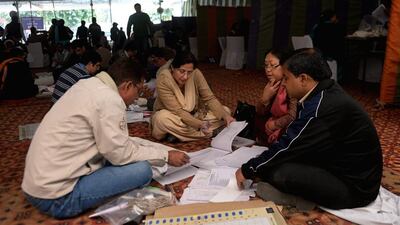NEW DELHI // Prakash Singh, who washes cars for a living in a south Delhi housing colony, is reluctant to reveal who he will vote for in his city’s election today.
But talk to him long enough and the answer begins to slip out.
Mr Singh says he is not happy with the way prices of everyday commodities have risen over the past two years, showing his disapproval of Delhi’s Congress party government led by chief minister Sheila Dikshit.
He also says the main opposition, the Bharatiya Janata Party (BJP), is rudderless.
“They haven’t been able to tell us exactly what people like me will gain if we vote for them,” Mr Singh, a slight man of 27, says.
But for the first time in decades, a viable third party is competing for the city’s 12 million votes, and Mr Singh betrays some excitement when he considers the third option: the Aam Aadmi Party (AAP), just over a year old, and led by the activist Arvind Kejriwal.
“At least they’re new, at least they have promise,” he says. “I don’t know if they’ll win. They probably won’t. But they’ve stirred things up a little.”
Mr Singh is not the only one to sense that change is in the air, just as he is not the only one to wonder precisely what kind of change that might be.
Pollsters have thrown up a confusing mix of conclusions, with the only common factor being that Ms Dikshit’s government, after 15 years in power, will struggle to win another term.
A survey of 2,101 voters, conducted by the firm TNS for the Economic Times newspaper, projected the Congress party getting only 20 per cent of the vote, with the AAP winning 42 per cent and the BJP 21 per cent.
Another survey, conducted by Cicero Associates and commissioned by the AAP, projects the party winning 44 of the 70 seats in the legislature, the Congress 11 and the BJP 14.
But a third survey, by an agency called CVoter, gave the AAP just 10 seats out of 70. The Congress and the BJP would run neck and neck, the survey said, winning 27 and 29 seats respectively.
Ms Dikshit, 75, is campaigning on her government’s track record over her past three terms. At a press conference on Monday, she said that Delhi “has changed for the better” during her time in office.
“There has been inclusive growth in social and economic sectors. Infrastructure, too, has improved remarkably,” she said, adding that she would continue to focus on roads and the city’s economic base.
She also promised the addition of 30,000 skilled, high-paying jobs every year, the construction of schools, and expanded evening classes in colleges.
The BJP has campaigned in Delhi largely on the basis of inflation; the most common BJP billboard across the city depicts piles of onions and tomatoes, pointing out that consumers are paying nearly 100 rupees (Dh5.90) a kilo for onions and 80 rupees for tomatoes.
The AAP has promised 700 litres of free piped water to each house, halving of electricity tariffs, and some devolution of decision-making to neighbourhood committees.
“Sceptics have naturally questioned the AAP’s bagful of promises,” an editorial in The Hindu newspaper said yesterday. “But more than all this, what explains the visible voter interest in the AAP is its idealism … Whatever the ultimate fate of the new entity, it has undoubtedly livened up the election run-up – and queered the pitch for the Congress and the BJP.”
The effect of the AAP’s entry to the race was shown on Thursday, when Ms Dikshit acknowledged the new party’s rise.
“I have faith in the people giving a clear verdict,” Ms Dikshit told the CNN IBN news channel. But then she added: “I don’t rule in or rule out a post-election alliance with the Aam Aadmi Party.”
But Nitin Pai, a co-founder of a Chennai-based think tank called the Takshashila Institution, said it may “just be the fact that a new party has come in and has made waves that has made the incumbent unsure. The truth is that we have no idea if the electorate thinks the same way.”
Mr Pai pointed out that the Delhi elections, like the recent elections in the states of Madhya Pradesh, Chhattisgarh and Rajasthan, are being watched keenly to assess whether Narendra Modi, the BJP’s prime ministerial candidate in the national election next summer, has made any effect on voting patterns.
“This is sort of a semi-final for Modi, to see if the Modi Effect can help the BJP win any of these states,” Mr Pai said.
The verdict of Delhi’s voters, as well as of those in the three states, will be known on Sunday, when the votes will be counted.
ssubramanian@thenational.ae

